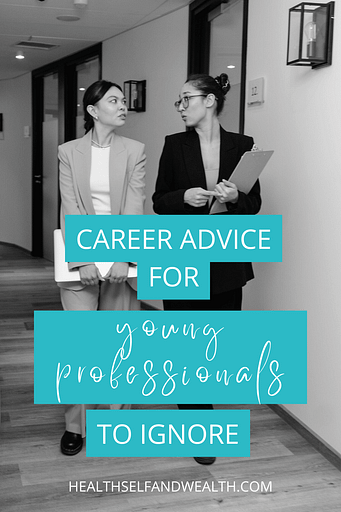
Ignoring some traditional career advice for young adults will prevent you from losing HALF your lifetime earnings.
If I would’ve followed all these “best practices” I wouldn’t have my current role as a manager at a Fortune 50 company at 23 years old.
It’s just as important to know what career advice for young adults NOT to follow as it is to follow good advice.
Everyone is unique and there’s no one path for a successful career. When you read these 11 pieces of traditional career advice for young adults to ignore, consider what would work best for your unique journey.
- Follow your passion
- Go to college
- Find your dream job
- Apply for jobs only if you meet 100% of the requirements
- The best worker always gets the promotion
- You don’t have to ask for a raise
- Stay at a job for 2+ years
- Be patient
- Work within your job description
- You’re not at work to make friends
- The work always comes first
Follow your passion
Now at a first glance following your passion seems like great advice. Until you get a degree in folklore studies and can’t find a job that compensates well enough to pay off your student loans.
I’m not saying you shouldn’t follow your passions, but your passions don’t have to be your career!
There’s this philosophy centered around the good enough job. The good enough job is one you like. You probably wouldn’t call it your dream job but your co-workers are a blast, you have a good work/life balance, and it pays you well.
It gives you the means to live your life the way you want to outside of work. You pursue your passions when you’re not at work, with the added bonus of fully enjoying your passions without the pressure of needing them to pay the bills.
I like my job, but if they stopped paying me tomorrow, I wouldn’t show up. First and foremost I work for my financial well-being.
This advice won’t warm your heart or make you smile, but if you plan to rely on your career as your primary source of income, don’t follow your passions, follow the money and find the good enough job.
Go to college
When I was in high school, it was inconceivable that I wouldn’t go to college. Literally the thought never crossed my mind.
Especially as a first generation college student, my mom was adamant about me going to college because that was the path for living a better life.
Now you can learn just about anything, often for free, online.
For me, I wouldn’t be where I am today without my undergraduate degree in business.
I also recognize it’s not the only way, nor is it the right path for everyone.
If you decide to go to college, make sure your degree will pay well enough to offset the costs so it’s a smart investment in your future.
Find your dream job
I’m not 100% convinced the dream job exists. Like any experience, there’s good along with the not-so-good.
There seems to be all this unnecessary pressure around finding the perfect job that doesn’t feel like work. And I know there are people who have a job they’d describe as their dream job.
But if you haven’t found it, you’re not missing out. The dream job is over romanticized.
When you think back on your favorite life memories 40 years from now, will you think about the time you locked yourself in a room to address some “emergency” that wasn’t truly urgent while your family visited and played cards downstairs?
The dream job is a myth to keep you satisfied with performing as an employee in the workforce.
Apply for jobs only if you meet 100% of the requirements
Said one woman to another. Even a self proclaimed financial feminist gives advice on her tiktok page to apply for the job if you don’t meet 100% of the qualifications.
Then lists her own job posting with a strict, “do not apply unless you meet 100% of the qualifications.”
Employers write job descriptions for the dream candidate the same way you think about your dream job.
If you meet every single requirement on the job description, you are overqualified for the job.
Many times employers hire based on personality/culture anyway because they can teach you everything you’d need to know on the job.
So next time you catch yourself debating on whether or not to apply for the job, apply.
Ladies, we are no longer rejecting ourselves! Let the employer decide if you’re qualified.
The best worker always gets the promotion
If only it worked this way. Instead the best ~known~ worker always gets the promotion.
I remember hearing this story one time about a woman who saved the company over a million dollars.
When it came time for a promotion though, her peer got it even though he only saved the company $25K.
Why? Everyone knew this man saved the company $25K but no one knew how much money she saved the company.
If you want to be recognized for your achievements, people have to know what you accomplished.
This principle took me years to get comfortable with. It’s weird to say good things about yourself out loud to other people. Especially as a woman, this practice contradicts many ways society tried to condition me to behave.
How did you feel when I mentioned sharing your wins with others?
Reflect on why that is.
In the meantime, if you need someone to cheer you on, send me a message. I love celebrating other people’s wins!
You don’t have to ask for a raise
That’s just not true. You have to be your own best advocate. No one else will do it for you.
Don’t leave your well-being in your employer’s hands. They certainly don’t care as much as you do.
Stay at a job for 2+ years
“It looks bad on your resume if you job hop.” “Be sure to stay at a company for at least 2 years so it doesn’t look like you are a job hopper!”
Have you heard this advice before? I sure have, and for a while I believed I needed to follow it.
Let’s take a step back. Who benefits from you believing this? Your employer.
Then I learned people who stay at a job for longer than 2 years tend to lose half their lifetime earnings.
It’s because employers typically offer new employees market rates to attract them. Many companies do not adjust their current employee’s wages to keep up with market rates.
If it were true, then you’d never get interview invitations after applying to a new role when you’ve been at your current job for less than two years.
I’ve tested this by applying to new roles around the 6-month mark of my first job after college. I broke the 2 year role by applying 1.5 years earlier than this rule suggests.
Companies didn’t care how long I had been at my previous role. Many of them didn’t even ask why I was looking for a new role in the interview. (Although I did volunteer it when they asked me the classic first interview question: “Tell me about yourself.”)
Now if you’re switching jobs every 3 months, maybe a recruiter would raise an eyebrow before deciding to call you. But if you’re a first time switcher or even if you hop every year, my hot take is that might be a smart move.
Switching jobs offers the potential to significantly increase your earnings. I’m talking high double digit raises or even doubling your compensation.
So decide for yourself when it’s the right time to apply for new roles and forget an arbitrary 2 year rule.
Be patient
According to the Oxford dictionary, to be patient means to be “able to accept or tolerate delays, problems, or suffering without becoming annoyed or anxious.”
This life is fleeting. Why should you or I spend any time unnecessarily suffering?
Now I know some people will come at me and say good things take time.
I’m talking about the scenarios when people/employers take advantage of you. Like the employers who say, “Sorry we can’t give you a raise this year. Maybe next year if you work a little harder.” And that’s what they’ve told you 5 years in a row now.
Actions speak louder than words. Use your judgment to decide if exercising patience will pay off, but consider the opportunity cost as you wait!
Work within your job description
Maybe this is the former A student overachiever in me, but I’ve never been good at working within the confines of a job description.
I’m curious, I ask questions, and I ~respectfully~ challenge the status quo. I’ve built a reputation for critical thinking, taking initiatives to solve problems no one else notices, and making big impacts.
It’s why senior executives, VPs, and CEOs have sought my input and feedback.
In the workplace, I don’t hesitate to take on additional responsibilities when I see problems worth solving.
Not every company or every role will find this valuable, however, I’ve never been one to play on my phone after getting all the work in my job description done.
If no one is telling me what else needs to be done, I will tell my employer so that I’m always adding value.
You’re not at work to make friends
I don’t know if anyone has ever said this, but at one point I believed it. Take 5 minutes to ask your co-worker about her puppy or vacation.
The people matter more than the work ever could. You contribute to the work culture. Make it a place you want to be.
The work always comes first
Do you live to work or do you work to live? I like to think I work to live, although with the number of hours I work, my friends may disagree.
That said, I know my priorities, and you should too. Knowing your priorities makes it easier to make decisions.
My priorities are my health, my self, and my wealth. (And that’s how Health Self and Wealth was created.)
Unless you are a doctor literally saving lives, ask yourself how you can make sure you give work the appropriate amount of energy based on where it falls in your priority list.
Conclusion
I’d argue knowing what career advice to IGNORE is just as important as knowing what advice to follow. After all, I wouldn’t be working as a manager at a Fortune 50 company at 23 if I followed all of this traditional advice.
Following some of this advice can cost you half your lifetime earnings, so always think critically about what advice you follow or ignore.
What traditional career advice would you ignore? If you feel strongly about one, please send me a note. I’d love to hear from you!
Want more insights for making money? Check out our Wealthy Women Club weekly newsletters.







